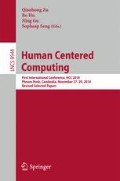Abstract
Cognitive radio technology has been proposed to improve spectrum efficiency by having the cognitive radios act as secondary users to opportunistically access under-utilized frequency bands. Spectrum sensing, as a key enabling functionality in cognitive radio networks, needs to reliably detect signals from licensed primary radios to avoid harmful interference. In this paper, we propose a Quantum-inspired frog leaping algorithm (QSFLA) based on frog leaping algorithm and we evaluate the performance of the QSFLA through some classical benchmark functions. Simulation results for cognitive radio system are provided to show that the designed spectrum sensing algorithm is superior to some previous spectrum sensing algorithm in probability of detection, convergence rate and accurate convergence value.
Access this chapter
Tax calculation will be finalised at checkout
Purchases are for personal use only
Preview
Unable to display preview. Download preview PDF.
References
Nosratinia, A., Hunter, T.E., Hedayat, A.: Cooperative communication in wireless networks. IEEE Communications Magazine 42, 74–80 (2004)
Laneman, J.N., Wornell, G.W.: Distributed space-time-coded protocols for exploiting cooperative diversity in wireless networks. IEEE Transactions Information Theory 49, 2415–2425 (2003)
Nabar, R.U., Bolcskei, H., Kneubuhler, F.W.: Fading relay channels: perfor-mance limits and space-time signal design. IEEE Journal on Selected Areas in Communications 22, 1099–1109 (2004)
Stefanov, A., Erkip, E.: Cooperative space-time coding for wireless networks. In: Proceedings of the Information Theory Workshop 2003, pp. 50–53. IEEE (2003)
Laneman, J.N., Tse, D.N.C., Wornell, G.W.: Cooperative diversity in wire-less networks: efficient protocols and outage behavior. IEEE Transactions on Information Theory 50, 3062–3080 (2004)
Xiaowen, G., Chandrashekhar, T.P.S., Junshan, Z., Poor, H.V.: Opportunistic cooperative networking: to relay or not to relay? IEEE Journal on Selected Areas in Commu-nications 30, 307–314 (2012)
Bletsas, A., Khisti, A., Win, M.Z.: Opportunistic cooperative diversity with feedback and cheap radios. IEEE Transactions on Wireless Communications 7, 1823–1827 (2008)
Annavajjala, R., Cosman, P.C., Milstein, L.B.: Statistical channel knowledge-based optimum power allocation for relaying protocols in the high SNR regime. IEEE Journal on Selected Areas in Communications 25, 292–305 (2007)
Lin, X., Tiankui, Z., Yutao, Z., Cuthbert, L.: Two-hop subchannel scheduling and power allocation for fairness in OFDMA relay networks. In: Fifth International Conference on Wireless and Mobile Communications. ICWMC ‘09, pp. 267–271 (2009)
Kennedy, J., Eberhart, R.C.: A discrete binary version of the particle swarm al-gorithm. In: 1997 IEEE International Conference on Systems, Man, and Cybernetics. Computational Cybernetics and Simulation, vol. 5, pp. 4104–4108 (1997)
Zhijin, Z., Zhen, P., Shilian, Z., Junna, S.: Cognitive radio spectrum allocation using evolutionary algorithms. IEEE Transactions on Wireless Communications 8, 4421–4425 (2009)
Hongyuan, G., Jinlong, C., Ming, D.: A simple quantum-inspired particle swarm optimization and its application. Information Technology Journal 10(12), 2315–2321 (2011)
Srinivas, N., Deb, K.: Multiobjective optimization using nondominated sorting in genetic algorithms. Evolutionary Computation 2(3), 221–248 (1994)
Deb, K., Pratap, A., Agarwal, S., Meyarivan, T.: A fast and elitist multiobjective genetic algorithm: NSGA-II. IEEE Transactions on Evolutionary Computation 6, 182–197 (2002)
Zitzler, E., Thiele, L.: Multiobjective evolutionary algorithms: a comparative case study and the strength Pareto approach. IEEE Transactions on Evolutionary Computation 3, 257–271 (1999)
Zitzler, E., Laumanns, M., Thiele, L.: SPEA2: improving the strength pareto evolutionary algorithm. In: Evolutionary for Design, Optimization and Control with Application to an Industrial Problems (EUROGEN2001), pp. 95–100 (2001)
Hee-jin, J., Cheol, M.: Capacity of multiuser diversity with cooperative relaying in wireless networks. IEEE Communications Letters 12, 752–754 (2008)
Laneman, J.N., Tse, D.N.C., Wornell, G.W.: Cooperative diversity in wire-less networks: efficient protocols and outage behavior. IEEE Transactions on Information Theory 50(12), 3062–3080 (2004)
Zhijin, Z., Zhen, P., Shilian, Z., Junna, S.: Cognitive radio spectrum allocation using evolutionary algorithms. IEEE Transactions on Wireless Communications 8, 4421–4425 (2009)
Elhossini, A., Areibi, S., Dony, R.: Strength pareto particle swarm optimization and hybrid ea-pso for multi-objective optimization. Evolutionary Computation 18, 127–156 (2010)
Naka, S., Genji, T., Yura, T., Fukuyama, Y.: Practical distribution state estima-tion using hybrid particle swarm optimization. In: Power Engineering Society Win-ter Meeting, vol. 2, pp. 815–820. IEEE (2001)
Author information
Authors and Affiliations
Corresponding author
Editor information
Editors and Affiliations
Rights and permissions
Copyright information
© 2015 Springer International Publishing Switzerland
About this paper
Cite this paper
Cheng, C. et al. (2015). Quantum-Inspired Shuffled Frog Leaping Algorithm for Spectrum Sensing in Cooperative Cognitive Radio Network. In: Zu, Q., Hu, B., Gu, N., Seng, S. (eds) Human Centered Computing. HCC 2014. Lecture Notes in Computer Science(), vol 8944. Springer, Cham. https://doi.org/10.1007/978-3-319-15554-8_7
Download citation
DOI: https://doi.org/10.1007/978-3-319-15554-8_7
Published:
Publisher Name: Springer, Cham
Print ISBN: 978-3-319-15553-1
Online ISBN: 978-3-319-15554-8
eBook Packages: Computer ScienceComputer Science (R0)

